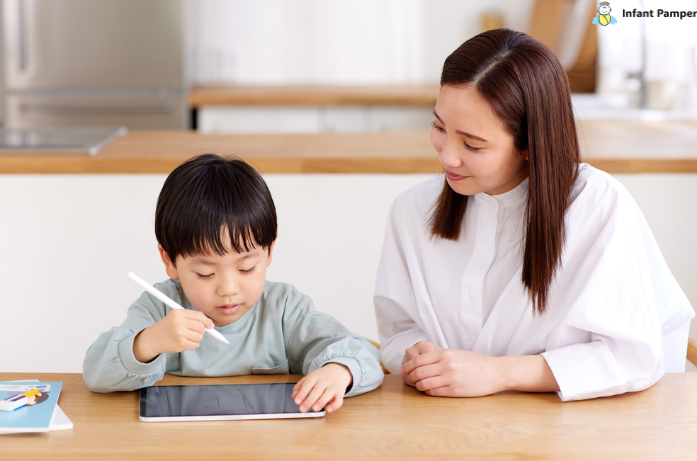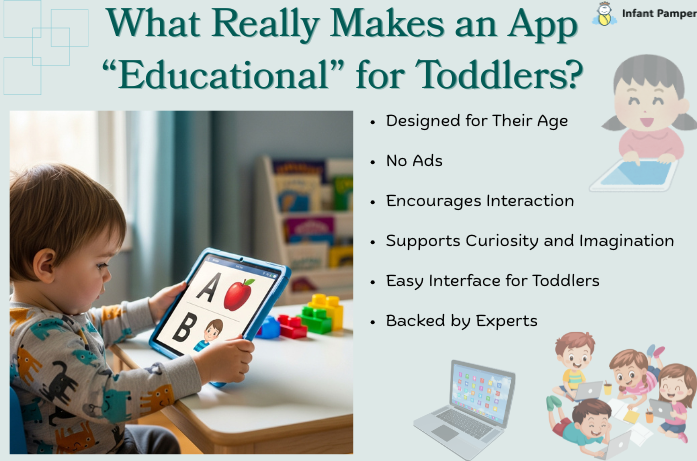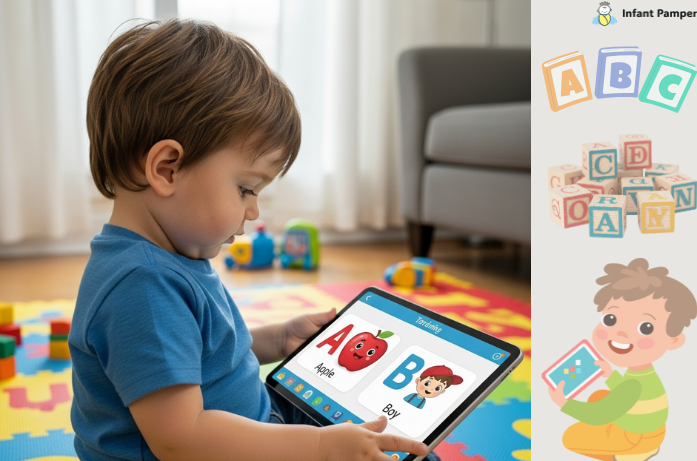By a caring mom at Infant Pamper
A given fact is that today, parenting often involves digital devices. Excessive exposure to screens for toddlers, obviously, is a red flag; but if in moderation, educational apps for toddlers can help development. Appropriate apps work toward early learning, help build vocabulary, advance fine motor skills, and also introduce problem-solving in playful ways that are apt for the child.
Do not go for passive video viewing; rather, go for interactive toddler apps that have edu-purpose agendas. Look for special features such as games for language development, shape and color recognition, and preschool puzzles. Interaction with parents and further off-screen play will make these apps worthwhile for a toddler to learn in a safe environment during limited screen time.

Why Some Screen Time Can Be Good for Toddlers
We are living in a digital world. It is neither sustainable nor even necessary to pretend that toddlers should get those zero screens.
The key is being intentional.
As per the American Academy of Pediatrics (AAP), toddlers aged between 2 to 5 years can watch screens for one hour per day if the content is of high quality, with an added advantage, when they do it with a parent or caregiver.
The premium screen time experience can bring these benefits into a toddler’s life:
- Encourage problem-solving and critical thinking
- Boost language development through storytelling and interaction
- Improve focus and attention span with goal-oriented play
- Develop fine motor skills through tapping, tracing, and dragging
- Teach emotions and empathy through story-based games
And just to note, if chosen wisely, these educational apps merge learning and fun beyond what a toddler can learn from books, playtime, and everyday interactions.

What Really Makes an App “Educational” for Toddlers?
Before we zoom straight to app recommendations, here is a quick rundown of what makes a toddler-worthy app:
- Designed for their age: The content needs to be appropriate for the child’s age and developmental stage-no too hard and no too simple.
- No ads : Avoid those apps that are riddled with pop-ups, third-party advertisements, or sneaky purchases that can irritate and confuse a toddler.
- Encourages interaction: Best of the best apps make their toddlers touch, explore, and provide responses instead of just sitting and watching.
- Support curiosity and imagination: Such apps support building of an object, solving simple puzzles, or learning through role play.
- Easy interface for toddler: big buttons, simple visuals, and minimum text enable easy navigation for tiny hands and minds.
- Backed by experts: Apps built by or reviewed by early childhood educators, psychologists, or child development specialists are always a plus.
If the app ticks most of these boxes, then I guess you are fine.
5 Best Educational Apps for Toddlers
1. Khan Academy Kids
- Organization: Khan Academy
- Focus: Reading, math, social-emotional learning, creativity
- Why It’s Great: This ad-free app offers a full early learning experience developed by educators and built by a non-profit. Helping the little one through stories, games, and lessons with animated characters is akin to a mini preschool on your device.
- Recommended Age: 2–8 years
2. PBS Kids Games
- Organization: PBS Kids
- Focus: Literacy, science, problem-solving, emotional development
- Why It’s Great: Filled with fun games featuring familiar PBS characters, this app is turning screen time into learning time. It has a very broad subject coverage and teaches kids to be kind, curious, and critical thinkers-toddlers’ very words in exploration of life.
- Recommended Age: 2–5 years
3. Sesame Street Family Play
- Organization: Sesame Workshop
- Focus: Social skills, numbers, language, everyday learning
- Why It’s Great: In contrast to many toddler apps, this one combines digital instructions with activities that are off-screen, fostering real bonding between the child and the parent through play and learning. Sesame Street favorites guide the way, giving parents a framework for turning screen time into active, hands-on engagement off the device.
- Recommended Age: 2–5 years
4. Endless Alphabet
- Organization: Originator Inc.
- Focus: Letters, phonics, vocabulary building
- Why It’s Great: Featuring adorable monsters and intriguing animated scenes, this app makes learning new words engaging and memorable. This is especially helpful when young children are learning that letters make sounds and words, thus learning early literacy skills through play.
- Perfect for: Ages 2–6
5. Sago Mini World
- Organization: Sago Mini
- Focus: Imaginative play, storytelling, emotional intelligence
- Why It’s Great: With over 40 mini-games, the app entices toddlers into safe worlds full of whimsy where they can build robots, fly rockets, or take care of pets. This fine balance between ability allows options to choose creativity, free play, and casual learning through exploration with no right or wrong way to do it.
- Perfect for: Ages 2–5
Note: Subscription required after free trial
How to Use Educational Apps the Right Way (Without the Guilt)
Basically, educational apps need to be tools, not a replacement for parenting. They work best when paired with you being there to discuss and do some real-life play with your kids.
Here’s a brief on some tips for reasonable use of these toddler learning apps (without a tinge of guilt):
Use it together: Sit with your child and discuss what occurs on the screen. Ask questions such as “What color is that?” or perhaps “What happens next?”
Establish limits: Limit screen time to 30–60 minutes a day.
Keep screens away during bedtime: Blue light interferes with sleep, so power down screens at least one hour before hitting the sack.
Never use screens as a reward-or a bribe: It can quickly manifest into power struggles. Rather, incorporate screen time into a predictable daily routine.
Mix it up. Digital play needs to be balanced with books, outdoor activities, and craft work. Apps should stay at the periphery of learning instead of substituting everyday learning.
When used intentionally, these apps can be a helpful and joyful part of your toddler’s development.
Signs Your Toddler May Be Ready for Educational Apps
Of course, many times toddlers will not accept apps; and that’s perfectly fine! Know the following signs to identify when apps may be benefitting them:
- Can sit and focus for a few minutes
- Enjoys books or interactive toys
- Is curious about letters, shapes, or animals
- Responds well to stories, music, or sound-based games
Remember that toddlers develop at their own pace. There is no need to rush.
Final Thoughts: You’re Doing Great
This can be a challenging task in modern parenting. Between the anxiety surrounding screen time and the guilt surrounding its use, few people manage to find the right path. But even just by researching and considering your options, you’re demonstrating that you care deeply about your child’s development.
With the right educational apps, balanced limits, and your involvement, screen time can be a positive part of your toddler’s day. It’s not about perfection, it’s about connection, learning, and love. So take a breath, trust yourself, and know that a few mindful minutes on the screen can truly support your little one’s journey.
FAQs About Toddler Learning Apps
Q1. How much safe screen time for toddlers?
About 30 to 60 minutes of high-quality screen time a day for ages 2-5, preferably viewed with a parent.
Q2. Can apps replace real play?
No. Apps should somehow add to books, outdoor fun, and simple types of play- nothing should be allowed to replace those.
Q3. What if my toddler isn’t interested?
That’s fine! Every child reacts differently. Try again later, or perhaps concentrate on toys and music he likes. Perhaps stories are his way.
Disclaimer: This content is for informational purposes only and is not a substitute for medical or developmental advice. Please consult a pediatrician or expert in child development for any concerns relating to your child’s screen time and learning.
At Infant Pamper, we are here to make parenting lighter and learning brighter. If you have found this guide helpful, please check out more of our tips and routines for toddlers, which are designed to support your little one’s development every day.




